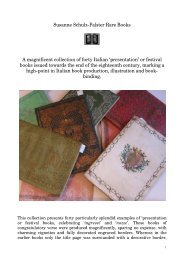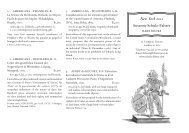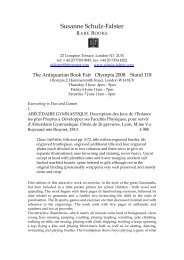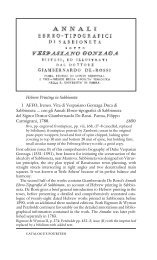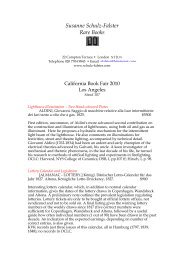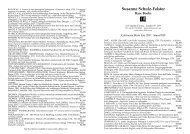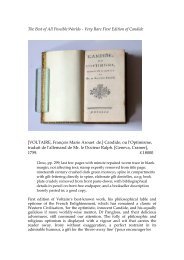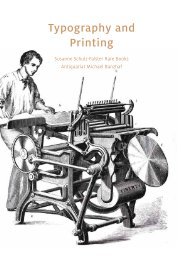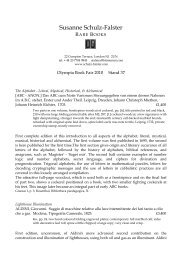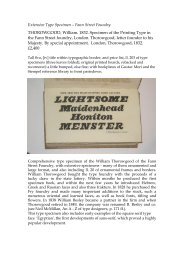Susanne Schulz-Falster Catalogue Ten - Schulz-Falster Rare Books
Susanne Schulz-Falster Catalogue Ten - Schulz-Falster Rare Books
Susanne Schulz-Falster Catalogue Ten - Schulz-Falster Rare Books
You also want an ePaper? Increase the reach of your titles
YUMPU automatically turns print PDFs into web optimized ePapers that Google loves.
Arranged in the form of eight letters, general medico-geographical information<br />
is presented. Menuret studies the natural condition of life in the city<br />
of Hamburg, particularly inXuenced by its geographical locations, with its<br />
long winters, wet climate and lack of sunshine. He makes some interesting<br />
comments on local diet: large consumption of strong tea and weak coVee,<br />
dark bread favoured by the inhabitants, fresh fruit and vegetables cultivated<br />
in Vierlanden. Menuret had earlier published similar surveys of Paris and<br />
Montélimar.<br />
<strong>Rare</strong>, NUC and RLIN record copies at the National Library of Medicine, and<br />
Madison, Wisconsin only.<br />
Eighteenth Century Periodical<br />
211 MEUSEL, Johann Georg. Historische Untersuchungen.<br />
Gesammlet und herausgegeben von Johann Georg Meusel.<br />
Nürnberg, Joh. G. Lochnerische Buchhandlung, 1779–80. £420<br />
Three parts in one volume, 8vo, pp. [xvi], 182, one folding plate; [iv],<br />
180; [iv], 240, [4]; title vignettes and head and tail-pieces;<br />
contemporary half sheep, spine decorated in gilt, gilt-lettered spine<br />
label, head of spine chipped, extremities a little rubbed.<br />
First and only edition of a short-lived historical journal, edited and partly<br />
written by the historian and statistician Meusel. His introduction is of particular<br />
interest, as he gives an extensive overview of current journals and<br />
periodicals. He points out the importance of this form of publication for<br />
the spread of scientiWc, technical, and historical ideas. The emphasis appears<br />
to be on early modern history, with contributions by contemporary historians<br />
Spitteler, Fäsi, Stieber, Longolius, and Albinus. Of particular interest is<br />
Spitteler’s demographic article on the population of Wurttemberg before<br />
the Thirty Year War. The last issue contains articles by Meusel himself, an<br />
interesting study on the history of language, and an extensive translation of<br />
a review on Dalin’s Swedish history.<br />
Kirchner 1102; very uncommon, RLIN and OCLC list only microWlm copies.<br />
‘One Quarter be paid before the 2nd Quarter becomes due’<br />
212 [MILITARY MANUSCRIPT.] An Establishment of his<br />
Ma[jesty’s] Guards, Guarrisons, & Land Forces wi[thi]n the Kingdom<br />
of England Dominion of Wales & Town of Berwick upon<br />
Tweed & the Islands thereto belonging with their full Pay &<br />
entertainment: to commence the 1st day of January 1683/4. £2000<br />
8vo, ll. 23 manuscript, written in a clean and legible hand, on paper<br />
ruled in red; Wnely bound in contemporary black calf, with intricate gilt<br />
Xoral design to upper and lower board, with two panels; gilt a little<br />
faded in parts; spine in compartments, silver clasps and catches in<br />
perfect order; a near perfect example of a Restoration binding; small<br />
chip to head of spine, a.e.g.; a very Wne copy.<br />
susanne schulz-falster rare books catalogue ten<br />
A very attractively bound seventeenth century English manuscript on the<br />
army establishment in 1684, in fact a complete list of the British military<br />
Establishment, its numbers and pay per day and per year ‘to commence the<br />
1st day of January 1683/4’. It is possible that the manuscript was later<br />
printed, as circulation in manuscript often preceded publication. The<br />
manuscript appears to be complete, even though two leaves, the stub of one<br />
having a fragment of writing, were removed at the end. Since the manuscript<br />
covers a period near the end of the reign of King Charles, it is possible<br />
that the Wnal leaves contained some expression of loyalty, or a concluding<br />
prayer, neither of which would have been particularly appropriate under<br />
the new and Catholic reign of James II. It is a very detailed document, setting<br />
forth the condition of pay from drummer to general, concluding with<br />
the excellent precept that everyone should be paid ‘so that one Quarter be<br />
still paid before the 2nd Quarter becomes due’.<br />
Harold Love, Scribal Publication in Seventeenth-Century England, Oxford 1993.



